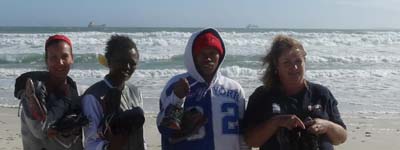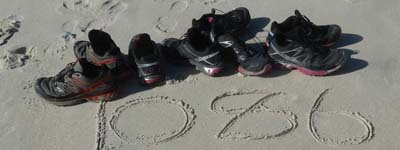
Photo Gallery of arrival in Cape Town
Dagbreek interview (kykNet) (YouTube)
Thank you from all UFS students (YouTube)
It was a gruelling road totalling a distance of 1 038 km, but the UFS #NSHstride team completed the challenge of walking all the way to Cape Town.
On Thursday 1 May 2014, Adéle van Aswegen and Ntokozo Nkabinde, both from the UFS, took on the road to Cape Town on foot in order to highlight the problem of food insecurity among students at the UFS.
Two kind-hearted Bloemfontein residents, Nico Piedt and Ronél Warner, tackled the journey together with them, not only to draw the country’s attention to food insecurity, but also to raise money to address the problem.
The hike, known as the No Student Hungry 1000/33 stride (or #NSHstride), came to an end at the St George’s Cathedral in Cape Town on Tuesday 3 June 2014.
About R500 000 were raised before, during and after the foursome’s hike.
The NSH bursary, established in 2011 by Prof Jonathan Jansen, the Vice-Chancellor and Rector of the UFS, and Rudi Buys, Dean of Student Affairs, aims to put food insecurity among students at the UFS under the spotlight.
Rudi Buys, Dean of Student Affairs, says: “We are completely inspired by the victory of a 1 000 km with one step at a time – as it reminds us of the courage of our students who beat hunger one day at a time.”
“The stride team challenges us to change our world for the better every day. We hope to continue their victory for students by challenging all universities to join the struggle for food security and will call a colloquium in this regard in October.”
These boots are made for walking ... to Cape Town (Article of 02 May 2014)
“Aren’t auntie and them hungry yet?” Country folk worried about NSH hikers (15 May 2014)
UFS hikers to Cape Town reflect on their journey (Article of 26 May 2014)

Daily updates:
(You can also follow us on @UFSweb for daily tweets)
Day 33: 2 June 2014
13:40
20 km
Sunset Beach, Cape Town
Day 32: 1 June 2014
16:05
26 km
Mervyn and Sanet Wessels, Belville
Day 31: 31 May 2014
16:31
39.6 km
Rhonell and Gavin Julain, Paarl
Day 30: 30 May 2014
14:00
16 km
Monte Rosa, Rawsonville
Day 29: 29 May 2014
13:16
31 km
The Habit, Worcester
Day 28: 28 May 2014
11:00
22.4 km
Monte Roza, De doorns
Day 27: 27 May 2014
17:00
21.1 km
Karoo Hotel
Day 26: 26 May 2014
18:27
43.3 km
Tows river
Day 25: 25 May 2014
12:18
Lord Milner Hotel, Matjiesfontein
Day 24: 24 May 2014
16:30
42 km
Laingsburg Country Lodge
Day 23: 23 May 2014
17:32
41.8 km
Vergenoeg
Day 22: 22 May 2014
16:42
43 km
Assendelft Lodge and Bush Camp, Prins Albert
Day 21: 21 May 2014
15:09
42 km
Leeu Gamka Hotel
Day 20: 20 May 2014
13:39
20 km
Alida, Springfontein
Day 19: 19 May 2014
12:31
27.6 km
Teri Moja Game Lodge
Day 18: 18 May 2014
First rest day
Nagenoeg Guesthouse, Beaufort West
Day 17: 17 May 2014
19:30
62.3 km
Nagenoeg Guesthouse, Beaufort West
Day 16: 16 May 2014
13:00
14 km
Taaibochfontein
Day 15: 15 May 2014
16:03
32 km
Travalia, Three Sisters
Day 14: 14 May 2014
18:33
43 km
Joalani Guest Farm
Day 13: 13 May 2014
17:30
33 km
Die Rondawels
Day 12: 12 May 2014
16:49
40 km
Aandrus B&B in Richmond
Day 11: 11 May 2014
39 km
Wortelfontein (Magdel and Christiaan)
Day 10: 10 May 2014
15:44
34 km
Hanover Lodge
Day 9: 09 May 2014
40.8 km
Camping between Colesberg and Hanover
Day 8: 08 May 2014
15:25
33.7 km
Colesberg, The Lighthouse Guesthouse
Day 7: 07 May 2014
15:08
23 km
Orange River Lodge
Day 6: 06 May 2014
15:57
51.06 km
Gariep Forever Resort
Day 5: 05 May 2014
12:18
28 km
Rondefontein
Day 4: 04 May 2014
15:27
35 km
Trompsburg: Fox Den
Day 3: 03 May 2014
17:30
46.74 km
Edenburg Country Lodge (Hotel)
Day 2: 02 May 2014
11:44 am
15.3 km
Tom's Place
Day 1: 01 May 2014
32 km
Leeuwberg